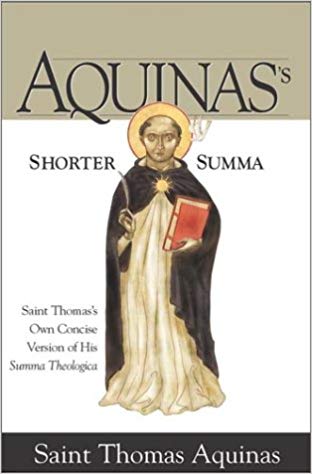A Brief Book Summary from Books At a Glance
By Steve West
Introduction
Near the end of his life, Aquinas was asked to produce a concise version of his massive and intricate Summa Theologica. Although he never finished it (the text breaks off where he died), his treatises on Faith and Christ provide a rather full synopsis of his doctrine. Written to be accessible, this book is an introduction to Aquinas’s thought which presents his basic theology without reproducing all of his subtle philosophical argumentation.
Table of Contents
Part 1: Faith
Author’s Introduction
The First Treatise on Faith: The Divine Trinity
– God
– The Holy Trinity
– Creation from Nothing
– The Human Soul
– God’s Activity in Creating
– The Purpose of Man
– Good and Evil
– Divine Providence
– Sin, Grace, and Eternity
– Death and Bodily Resurrection
– Glorified Body and Beatific Vision
– Heaven, Hell, and Purgatory
The Second Treatise on Faith: The Humanity of Christ
– Prologue
– Adam, Eve, and Original Sin
– Christ’s Incarnation
– The Virgin Birth
– Christ’s Crucifixion and Resurrection
– The Last Judgment
Part 2: Hope
Introduction
Hope and Prayer
Summary
Author’s Introduction
The infinite Word of God added smallness to himself and came to earth to save us. Our salvation consists in knowing the truth of God. Faith, hope, and love are required for living, and they work together. The knowledge of faith turns on knowing the Trinity, as well as the humanity of Christ. It is through Christ’s humanity that we come to know the deity.
The First Treatise on Faith: The Divine Trinity
The fact that God exists is known by reason. Movement requires explanation, and there cannot be an infinite series of movers. So God must be immovable and eternal. He is a necessary being, since he cannot change or come into existence; he depends on nothing outside of himself. All of God’s existence is eternal and without succession. He must also be a simple being, without composite parts. His essence is himself, since he cannot have accidental properties as a simple being—his essence is his existence. God is not a species or genus; he is uniquely existence. Since he cannot be a member of a species, there is only one God.
He does not have a body, since bodies are not simple, and one must first move the body to move something else. God is not lacking in any perfection or power: since he moves the creation towards their perfections, he must first have every perfection. These perfections are not multiple in God, however: since he is simple, they are one in and with his essence. Because we are limited we cannot grasp all of God’s nature, so we think of him in different ways and he reveals himself with different names. We cannot perfectly define God—our understanding of him is analogical rather than univocal or equivocal. God’s knowledge is not discursively attained; he understands through his essence. The will of God is identical with his intellect.
[To continue reading this summary, please see below....]The remainder of this article is premium content. Become a member to continue reading.
Already have an account? Sign In
Buy the books

AQUINAS'S SHORTER SUMMA: SAINT THOMAS'S OWN CONCISE VERSION OF HIS SUMMA THEOLOGICA, by Thomas Aquinas